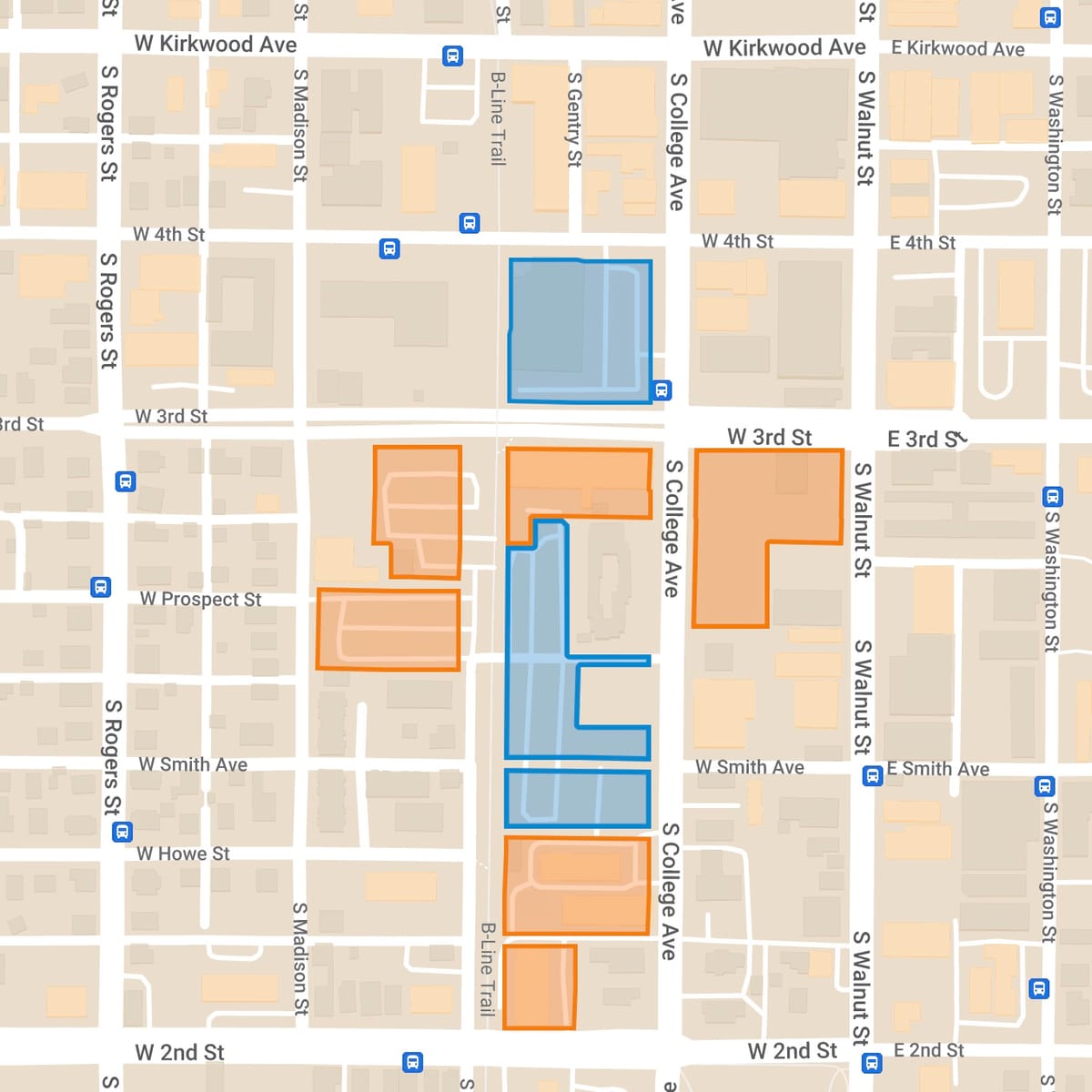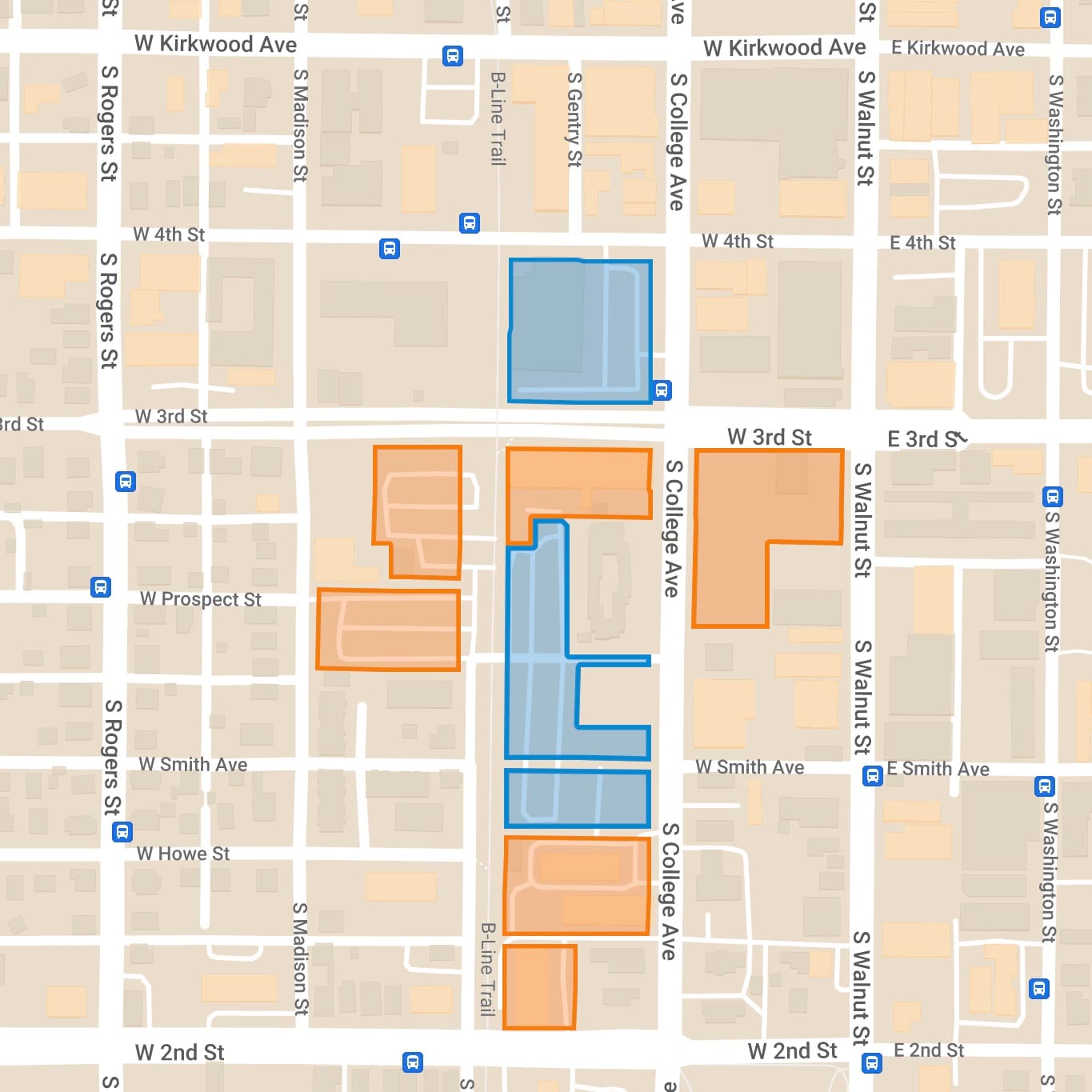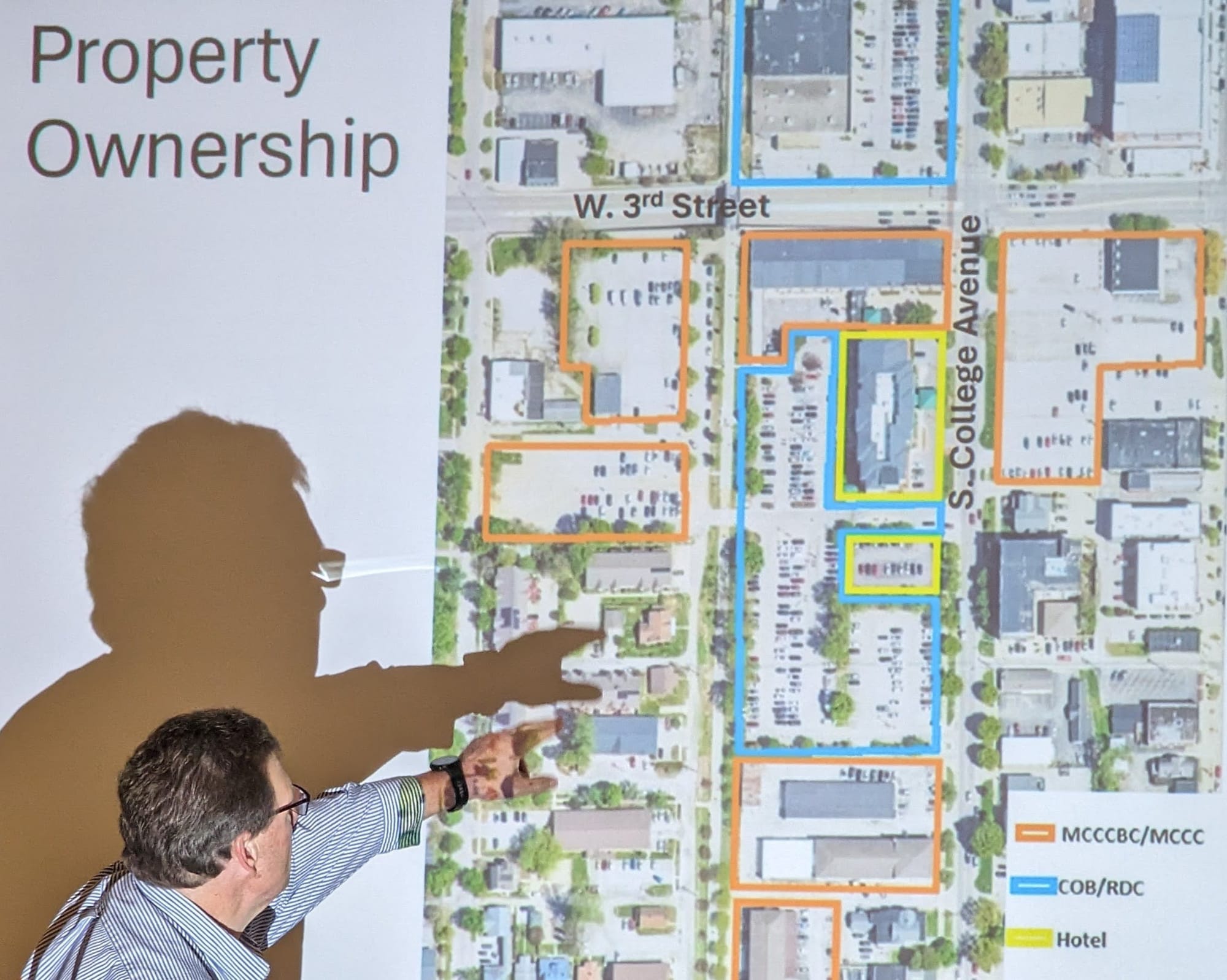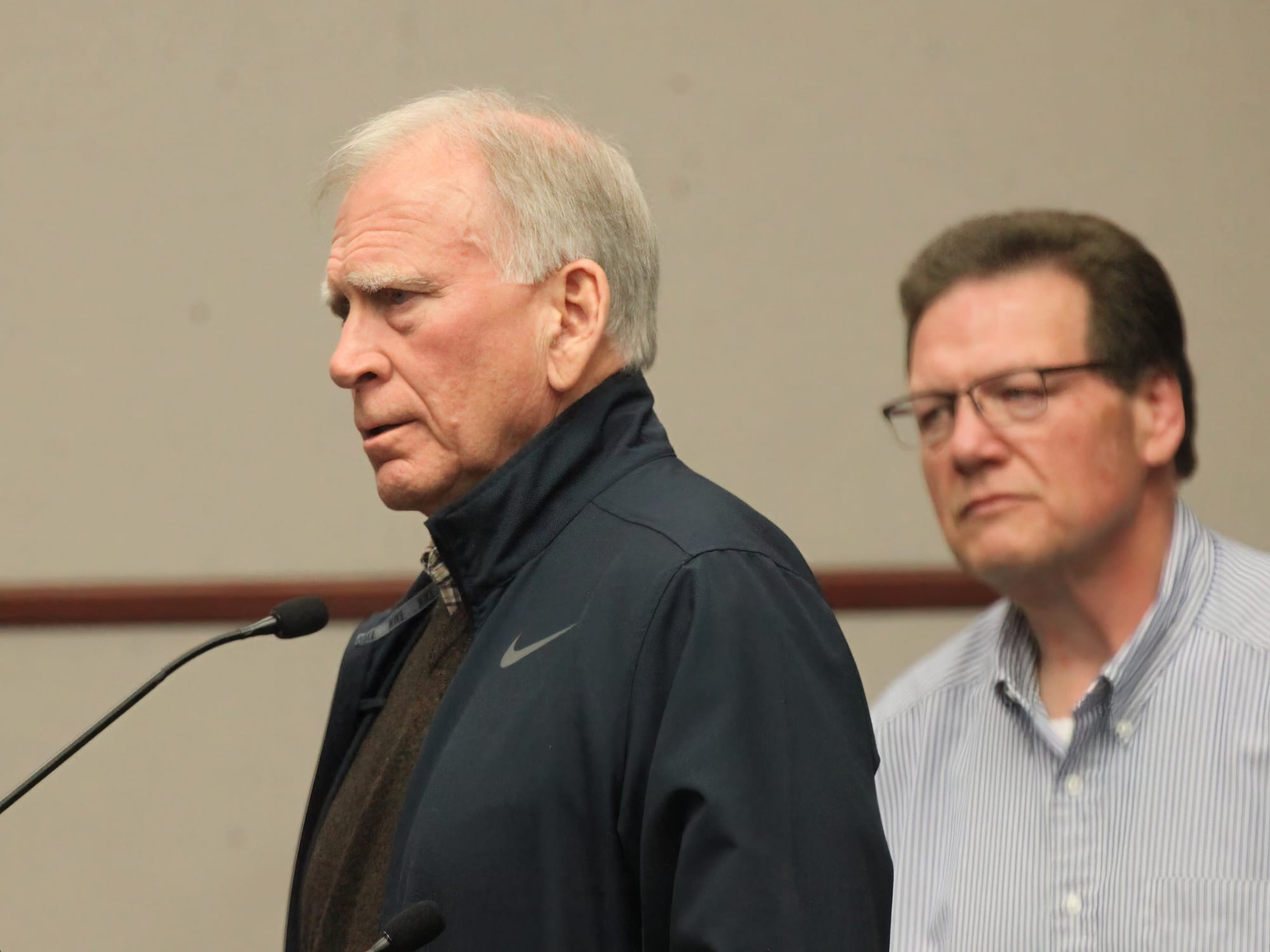CIB budget OK’d on split city council vote, answers on land for convention center hoped for by May 8







Wednesday night, the Monroe Convention Center expansion project took another step forward, on what turned out to be a less-than-routine vote by the Bloomington city council.
The vote to approve the Monroe County capital improvement board’s (CIB’s) 2024 budget was split 6–2. Dissent came from Kate Rosenbarger and Matt Flaherty. Not attending was Andy Ruff.
The CIB is the public body that was created by the Monroe County commissioners to provide the governance of the expansion project, which is supposed to be funded by the food and beverage tax. The extra 1-percent of tax on prepared foods and beverages has been collected since 2018.
Earlier on Wednesday, at the CIB’s regular meeting, the city council’s upcoming vote on the CIB’s $250,000 budget for 2024 was one of the highlights of the briefing from CIB treasurer, Eric Spoonmore.
Spoonmore reviewed for his CIB colleagues that the city council had voted unanimously at its March 27 meeting to ask the food and beverage tax advisory commission (FABTAC) for a recommendation on the use of the $250,000 in food and beverage tax revenue. Spoonmore called that city council vote an “easy process” that took just 10 minutes.
With the FABTAC’s recommendation on the books, the city council was set to vote on the budget later that night, Spoonmore said. He summed up the situation in a way that included a verbal hiccup, which might have foreshadowed what turned out to be nearly two hours of city council deliberations on the topic, with a split vote: “So everything is all good there, assuming that we have a similar unan– or approval from the city council.”
One of the CIB’s own votes at its Wednesday afternoon meeting was not unanimous. CIB member Jay Baer abstained on the vote to authorize CIB president John Whikehart to send formal letters of inquiry to owners of real estate near the existing convention center about the availability of their land for the expansion project. The existing convention center is located at 3rd Street and College Avenue.
The CIB would like to know from the property owners if the land is available, and if so, at what price—if any.
The owners of land under consideration for the expansion project are all public entities connected to either the city of Bloomington or Monroe County government—Bloomington Redevelopment Commission, Monroe County Convention Center Building Corporation, or Monroe County Commissioners.
A big focus of the land discussion is the former Bunger & Robertson property at 4th Street and College Avenue. Bloomington’s RDC used about $7 million in tax increment finance (TIF) money to purchase the property, in two separate transactions—one in 2019 and the other in 2023.
It is now sounding increasingly likely that Bloomington will look to get reimbursed for the $7-million TIF expenditure for the former Bunger & Robertson property—if the CIB decides to move ahead with the kind of northward expansion that would make use of the land. But a decision on northward expansion could be affected by the Bloomington RDC’s possible insistence that the money be reimbursed.
The formal letters of inquiry to be sent by Whikehart will include a request for a response by May 8, which is the CIB’s next meeting date.
Before Baer’s abstention, he indicated some discomfort with the idea of asking the landowners to respond to an “ultimatum,” based on just a map—especially when many of the players have changed since the question was last considered, in 2017. There are new RDC members, new city councilmembers, a new mayor and new county councilors.
Baer felt that the landowners would be able to give a better-informed answer, if they had a chance to look at the “rescoping” work that the CIB’s architect, Schmidt Associates, is currently doing, based on its preliminary design work in 2019. In that year, the firm considered northward, eastward and southern expansions.
Schmidt Associates is supposed to provide the CIB the updates to its previous preliminary design work, contemplating all directional scenarios, by May 8.
The city of Bloomington’s current share of the food and beverage tax works out to more than $4 million a year.
From the CIB’s point of view, a requirement that the $7 million be reimbursed to Bloomington’s RDC for the land required for a northward expansion would mean reducing the city’s current food and beverage fund balance, from about $17 million to about $10 million. That could have a significant impact on the size of the convention center expansion that could be built.
But if Bloomington’s RDC simply donated the former Bunger & Robertson property to the convention center project, that would be met with a strong objection from Flaherty, and possibly other members of the Bloomington city council.
At Wednesday’s city council meeting, Flaherty stated: “If the RDC decides to give the land to the project, that’s a problem, because that’s an opportunity cost with TIF funding—I’m not OK with that, actually, as a basic premise of how we fund this project.”
Related to the convention center expansion project, other non-starters for Flaherty include any use of fossil fuels on the premises for space or water heating, any public subsidy for a hotel, and any public subsidy for a parking garage.
During Wednesday’s meeting, Rosenbarger pressed Whikehart about the potential cost for a market analysis for a convention center for Bloomington. She wanted to know why there was not an updated market analysis.
Hunden Partners had done the last one in 2020, Whikehart said. In a recent conversation, Rob Hunden had told him that a full market analysis—a complete do-over—would cost $125,000. That could be pared down to as low as $32,000, Whikehart said.
Based on the input he’d received from Schmidt Associates, a market analysis at this time was not key, Whikehart said, but could become more important at the point when the CIB entered the bond market for the project.
Whikehart responded to Rosenbarger by saying: “I will tell you, the CIB will pay $125,000 for a market analysis, if the council wants to approve that as an additional part of our budget.” He continued, “So if you want to give us another $125,000 out of food and beverage tax, for a market analysis, we’ll be happy to accept it, and we’ll engage them in a market analysis.”
In the most recent public conversations about the convention center expansion, Rosenbarger has indicated an interest in using food and beverage tax revenues for tourism and economic development projects, not directly on the convention center.
Just over half ($130,000) of the CIB’s $250,000 budget is for the professional services of the CIB’s controller (Jeff Underwood) and legal counsel (Jim Whitlatch). During Wednesday’s meeting, councilmember Isak Asare asked why the city’s attorneys and the city’s controller could not perform those respective functions.
Whikehart responded to Asare by pointing out that under the ordinance passed by Monroe County commissioners in summer of 2023, employees of the city or county government cannot be employed by the CIB. The CIB was set up to be a neutral entity, Whikehart said.
What persuaded a majority of city council members to go ahead and vote to approve the initial $250,000 budget for the CIB was the fact that the controller and legal counsel have been working without pay since late last year. As councilmember Courtney Daily put it: “We need to not be deadbeat on our bills, and we just need to get those paid. And then have the conversation about how we want to move forward.”
The fact that the council was put in a position of having to act with urgency—to make sure the professional services were paid—was a source of frustration for Flaherty. “It seems to me like poor fiscal management, that really is creating a sense of urgency now, to just vote on this to pay our bills—when that’s not how we should be making decisions.”
The CIB started meeting in October 2023. Doug Bruce, who is the city council’s appointee to the CIB, briefed the council at its Feb. 7 meeting about the situation with payment to the CIB’s legal counsel and the controller for their services.
The money was appropriated by the city council in 2023 as a part of the 2024 annual budget for the city of Bloomington. But the four-way interlocal agreement on the operation of the CIB was not ratified by all four sides in the county and city governments until the end of February 2024. The interlocal agreement outlines how the CIB’s budget gets approved.




Comments ()